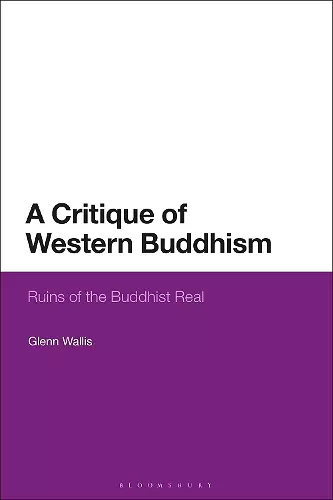A Critique of Western Buddhism
Ruins of the Buddhist Real
Format:Hardback
Publisher:Bloomsbury Publishing PLC
Published:6th Sep '18
Currently unavailable, and unfortunately no date known when it will be back

This book offers a critical examination of Western Buddhism, exploring its relationship with contemporary wellness practices and suggesting a new approach to Buddhist thought.
In A Critique of Western Buddhism, Glenn Wallis examines the intersection of Western Buddhism and the contemporary wellness industry, revealing how this alignment may dilute the profound teachings of Buddhist thought. He argues that by embracing modern wellness trends, Western Buddhists often overlook essential Buddhist concepts such as vanishing, nihility, extinction, contingency, and no-self. These ideas are fundamental to understanding the nature of reality as articulated by Buddhism, which emphasizes the importance of confronting this reality for genuine human awakening.
Wallis presents a threefold critique of Western Buddhism. Firstly, his approach is immanent, emerging from Buddhist thought while pushing its boundaries. Secondly, he employs a negative critique, utilizing the deconstructive methods of François Laruelle’s non-philosophy to challenge prevailing interpretations. Lastly, his re-descriptive method applies Laruelle’s concept of philofiction, offering a fresh perspective on Buddhist practices. Through this innovative lens, A Critique of Western Buddhism suggests a new practice for our time, termed 'anthropotechnic', which seeks to reframe religion away from idealistic illusions and towards a more grounded understanding.
Ultimately, this book serves as a thought-provoking exploration of Western Buddhism, encouraging readers to engage with the core truths of the tradition. Wallis's insights prompt a reconsideration of how contemporary practices might align more closely with the fundamental teachings of Buddhism, fostering a deeper connection to its philosophical roots.
Having read through the book a second time I can say without hesitation that A Critique of Western Buddhism is one of the most important books ever written on the subject of Buddhism—certainly the most important in the decades since Buddhism has established itself as an ideological resident here in the West. * The Failed Buddhist *
The single most important book of contemporary Buddhist philosophic reflection. Wallis’ critique masterfully addresses the twinned questions central to contemporary Buddhism: ‘What use is being made of Buddhism today?’ and ‘What use is Buddhism today?’ * Richard K. Payne, Yehan Numata Professor of Japanese Buddhist Studies, Institute of Buddhist Studies, USA *
It is a very rare and precious thing to find a book such as this, which engages as deeply with religious materials as it does with the philosophical. Glenn Wallis brings together resources from Continental philosophy, namely François Laruelle’s non-philosophy, and concepts and ideas from Buddhism to carry out a A fecund project that grows in the ruins of our philosophical and religious pretensions and arrogance.” * Anthony Paul Smith, Associate Professor of Philosophical Theology, La Salle University, USA *
Glenn Wallis' Critique of Western Budism is one of the rare examples of non-philosophy applied on a specific subject area, next to Anthony Paul Smith's non-philosophical environmental studies, John O'Maoilearca's animal studies as well non-Marxism. It proves that non-philosophy is praxis grounded rather than being self-sufficient system of philosophical diagnostics. Wallis’ brilliant analysis demonstrates that radicalized Buddhism establishes a perfect homology with non-philosophy, both in form and in substance. * Katerina Kolozova, Professor of Philosophy and Gender Studies, University American College, Macedonia *
Wallis' Critique is a bold commentary and analysis of Western Buddhism that runs against the mainstream. His central arguments are convincing and should certainly enter into discussions of "mindfulness" practices and adaptions of Buddhism in Western societies. This book will challenge the thinking and practice of many readers, make some uncomfortable, but will be a life preserver for others. * Stuart W Smithers, Chair of the Department of Religious Studies, University of Puget Sound, USA *
It is safe to say that this book is not for the faint-hearted. Not only does it force the reader to query with honest dedication into the depths of a vast living tradition, Buddhism, which has chunky ancient roots and innumerable
old and new branches as well; it also obliges one to come up to par with the demands of current Continental philosophy, namely, that of the non-philosophy of François Laruelle. ... Wallis’s endeavor has produced a seminal critical text that asks more profound questions and comes up with more promising answers than most of what we could find in the past half-century’s literature on Buddhism in the West.
ISBN: 9781474283557
Dimensions: unknown
Weight: 508g
232 pages